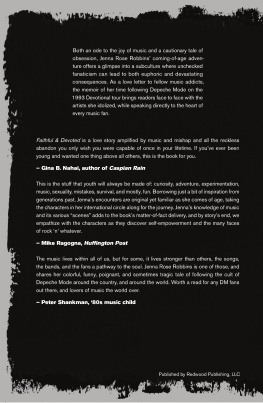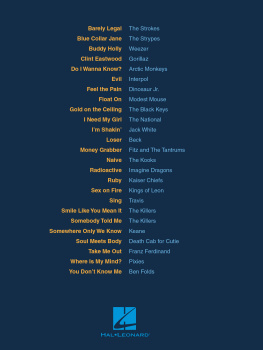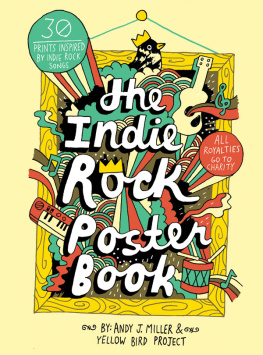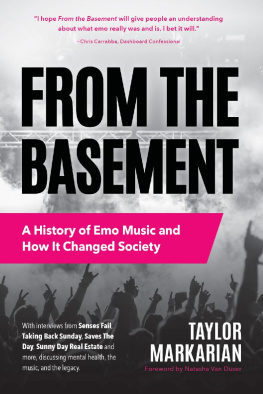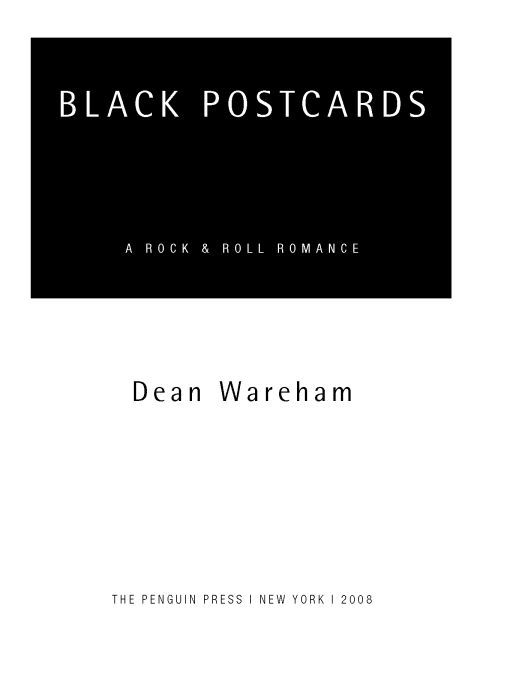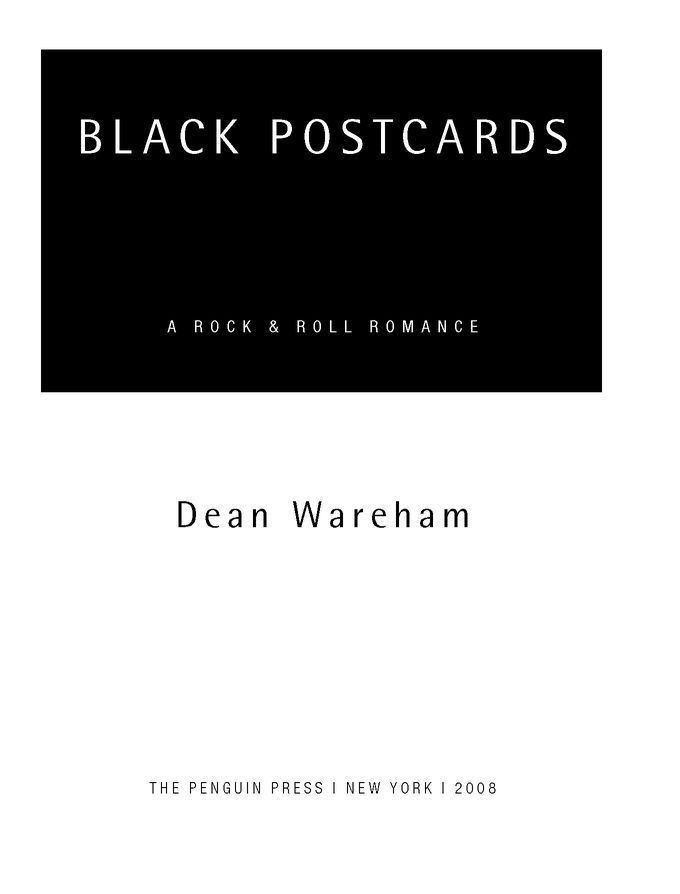Table of Contents
Four to Fourteen
Naomi and I had developed a strong distrust of Dean, which in the end turned
out to be not nearly strong enoughwe were blind-sided, despite our misgivings
about the person he was becoming and the ways in which he was
dealing with our modicum of success. To give an example: during the Los
Angeles show on our last tour, Dean (who almost never moved during our
shows) suddenly stepped downstage front and center during a guitar solo,
and a white spotlight materialized, focused directly on him. Apparently
this had been arranged with the sound and lighting people beforehand.
Nothing, but nothing, like that had ever been done at a Galaxie 500 show,
and it completely freaked me outI remember struggling to keep the beat
while it happened, I was so surprised. In retrospect I notice that Dean chose
the L.A. show to launch this new trick, when the audience was full of music
industry people. We hadnt had any spotlights in Columbus or Dallas!
(Damon Krukowski, from an interview with the fanzine Ptolemaic Terrascope, 1997)
Yes, we had been friends. We rode together in cars, vans, planes, trains, and hovercraft. We shared small humiliations and grand successes. We came in dead last in a talent show. We picnicked on Plum Island. We led a revolution and were led to the guillotine. We discovered Love and the Red Crayola. We played to six people on a snowy night and thirty thousand in a muddy field. There were hockey rinks and belly-dancing clubs, art galleries and high schools. We played Cookys and Chets Last Call, Bunrattys, CBs, JBs, the 40 Watt, the Casbah, the Pyramid, the Point, the Paradise, the Paradiso, Roseland, Club Lingerie, Lounge Ax, the Ecstasy, the Batcave, the Boardwalk, the Milky Way, the New Moon, the New Morning, Nightingale Bar, Nightbirds, the Bierkeller, the Rathskellar, the Top Hat, the Falcon, and the Adelphi.
I met Damon in 1977in ninth-grade European history class at the Dalton School. Ms. Eastman, our teacher, was cool, but the class was more exciting when her boyfriend and colleague, Vito, took over. He was an Italian Marxist and he made feudalism exciting. Instead of asking us to memorize dates and the names of kings, he drew diagramsarrows pointing from serf to vassal to lord of the manorthat showed how the feudal system contained the seeds of its own destruction.
I was fresh off the boat from Australia, but Damon had been at Dalton all his life. His father ran a PR company and his mother was once a jazz singer. Her first album, Wild Women Dont Get the Blues, was produced by jazz critic Nat Hentoff (whose son Tom was also at Dalton).
Naomi Yang was also at Dalton, one year behind Damon and me. Naomis father, a photographer and architect, was born in China but grew up in New York City. Her mother wrote gardening columns for the New York Times. Naomi and I took one class togetherstagecraft, which taught us the art of designing and building theatrical sets. We sometimes made sketches of stage sets, and while drawing was not a talent of mine, Naomis drawings were effortlessly perfect.
Dalton sits on Eighty-ninth Street between Lexington and Park Avenueswhich may be why the New York Observer once wrote that my ancestral home was Park Avenue. You can catch a glimpse of the school, and some of my friends even, in Woody Allens Manhattan, shot in 1979. In the film, an older man (Woody) dates a seventeen-year-old Mariel Hemingway, who is a senior at Dalton. Some parents were outraged at the suggestion that a Dalton girl would date an older man, but one of my teachers was forced out of the school for this very transgression (though he had waited until after the young lady graduated before starting the hanky-panky).
I was born in Wellington, New Zealand, in 1963. My great-great-grandfather Joseph Wareham had settled in New Zealand exactly one hundred years earlier. Born in Philadelphia, he served as a water boy during the Crimean War and was in Calcutta during the Indian Mutiny of 1857 before relocating to the Boston suburb of Roxbury. In 1861 he enlisted in the U.S. Navy. He served on the USS Colorado during the Civil War and was part of an expedition of one hundred sailors that was sent to destroy a Confederate schooner, the CCS Judah, at Pensacola Harbor. Joseph was injured in the battle, but recovered and made his way to Hokitika, New Zealandgold rush territory. He later became a hotel keeper, as did his son William.
William married Evelyn Trudgeon, a beautiful woman who was hired by the Fuller Vaudeville Company to sing during the intermissions at His Majestys Theatre in the suburb of Petone, while the movie reels were being changed.
Their son (my grandfather) Jack was the star of the familya sprinter, cricketer, and big-time rugby player for Wellington. He wanted to be a doctor, but the Depression forced him into the catering business instead. So on my fathers side it was hoteliers and caterers. My mothers father was a pharmacist, as were her three brothers.
My mother, Margaret Owles, grew up in the Wellington suburb of Lower Hutt. She loved ballet and theater, and was offered a scholarship at a drama school at age sixteen. Her father insisted that she do something more sensible, and enrolled her at Gilbys Business College in Wellington, where she studied useful subjects like typing, shorthand, and bookkeeping. Her cousin worked at a bank alongside my father, John, who worked as a teller while studying at Victoria University. It was here, in June 1958, that my parents laid eyes on each other. She was seventeen, he was eighteen. Their first date was at a coffee shop on Cuba Street. My father reports that my mother was incredibly shy on that date. Two years later they were married.
My parents, my older brother, Anthony, and I lived in a little wooden house on Tirangi Road, right by the airport, steps from the air traffic control tower itself, which is situated up on a hill overlooking the airstrip. Wellington is a beautiful little city. It reminds me a bit of San Francisco, only smaller and theres no Haight-Ashbury or City Lights Books. But its many hills are dotted with beautiful wooden Victorian homes with lovely views of the city. As Wellington lies directly on a fault line, we had earthquake drills in kindergarten, during which we had to huddle under our wooden desks.
At age four I heard Georgy Girl on the radio. It was a huge hit for the Seekers, an Australian vocal group who were as big as the Beatles in 1967 in New Zealand. They sounded kind of like Chad and Jeremy, or the Mamas and the Papas, but stripped down to acoustic guitar, upright bass, and vocals. Georgy Girl was co-written by Tom Springfield (Dustys brother). The Seekers had other glorious hit songs, too, like A World of Our Own, The Carnival Is Over, and Ill Never Find Another You.
If we spend our whole lives trying to recapture some of the magic of childhood, then perhaps I have spent mine trying to re-create the feeling that I got from hearing Georgy Girlbeauty and sadness and ecstasy all together.
On August 1, 1968my fifth birthdayI started at the public school in Seatoun. This first day away from the nest was scary. I sat under a piano all day and, knowing that Anthony was somewhere in the building, cried, I want my brother.



